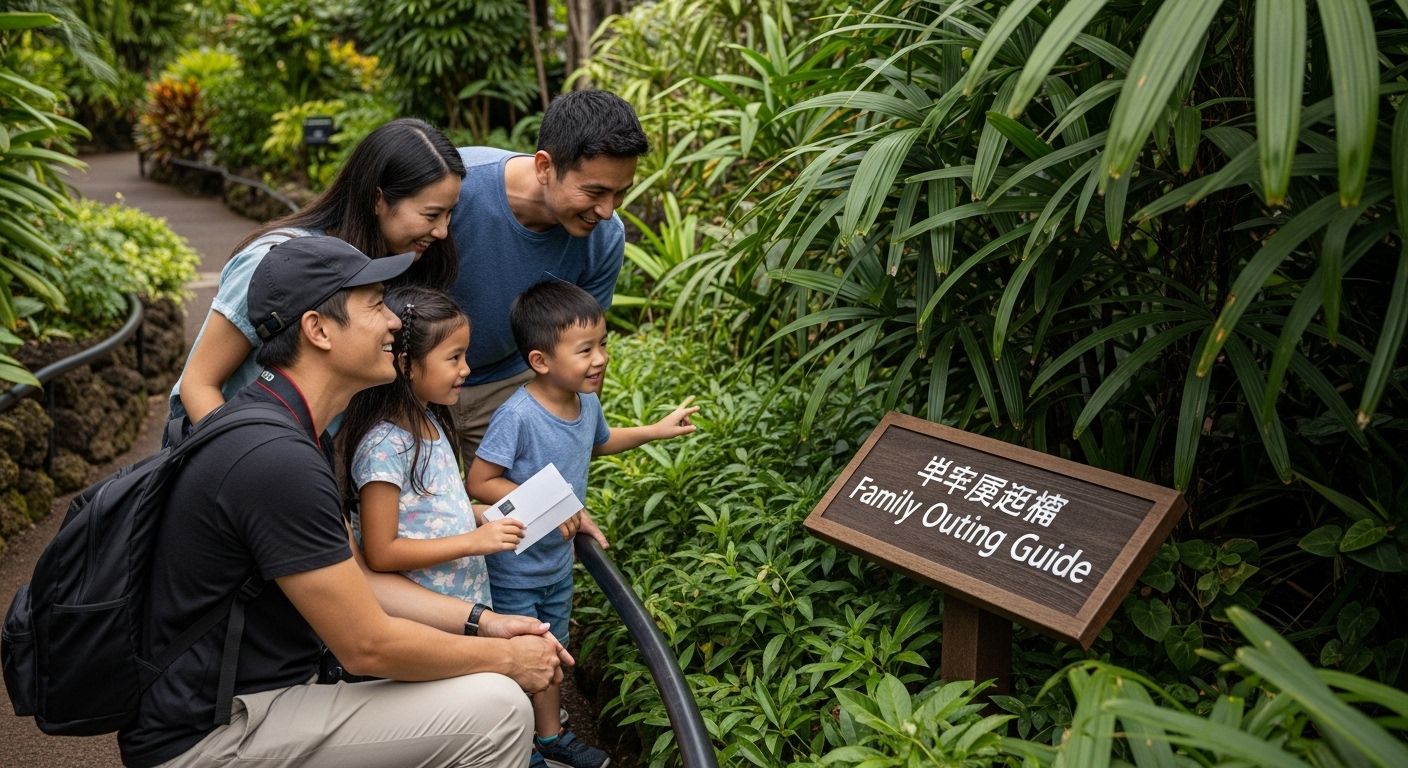Understanding the Family Outing Guide Hawaii Experience

Hawaii draws families for much more than just postcard beaches. Across the islands you can hike rainforests, watch lava flow, and even visit volcanic parks where the ground is alive beneath your feet. Think vacation means lazy days by the water. Hawaii flips that idea upside down with over 2,600 different native plant species found nowhere else on earth and outdoor adventures that turn every family trip into a living science and culture lesson.
Table of Contents
- What Makes Hawaii A Unique Destination For Family Outings?
- Exploring Cultural Attractions: Why They Matter To Families
- Understanding Outdoor Activities: Connecting With Nature In Hawaii
- Navigating Transportation Options For Family Outings In Hawaii
- Key Considerations For Planning Your Family Outing In Hawaii
Quick Summary
| Takeaway | Explanation |
|---|---|
| Engage in Cultural Learning | Participate in traditional workshops and demonstrations for a hands-on cultural experience. |
| Explore Unique Natural Attractions | Visit national parks to witness active volcanic landscapes and diverse ecosystems. |
| Utilize Multiple Transportation Options | Combine rental cars and public transport to enhance mobility across the islands. |
| Prepare for Varied Environmental Conditions | Pack versatile clothing and supplies to adapt to changing weather and terrain. |
| Plan Activities for All Ages | Tailor your itinerary to include experiences that accommodate the interests and abilities of every family member. |
What Makes Hawaii a Unique Destination for Family Outings?
Hawaii offers families an extraordinary travel experience that transcends typical vacation destinations. Unlike standard tourist locations, this archipelago provides a multifaceted journey combining natural wonder, cultural richness, and immersive learning opportunities that appeal to travelers of all ages.
Cultural Immersion and Educational Adventures
Families visiting Hawaii can expect more than just beautiful beaches. The islands present a living classroom where children and adults alike can engage with profound cultural experiences. Discover the unique attractions that transform vacations into meaningful educational journeys. From exploring ancient Hawaiian archaeological sites to participating in traditional cultural workshops, families gain insights into the rich Polynesean heritage that makes these islands extraordinary.
Key educational experiences include:
- Visiting National Parks with Junior Ranger programs
- Participating in traditional cultural demonstrations
- Learning indigenous language and storytelling techniques
- Exploring volcanic landscapes and marine ecosystems
Unparalleled Natural Diversity
According to the National Park Service, Hawaii’s national parks like Haleakalā and Hawaii Volcanoes offer unique geological adventures that are unmatched globally. Children can witness active volcanic landscapes, understand complex ecological systems, and experience environments that seem almost extraterrestrial. These parks provide structured yet exciting learning experiences where families can observe unique wildlife, understand volcanic formations, and appreciate the delicate balance of island ecosystems.
The Hawaiian Islands represent more than a destination they are a comprehensive, immersive experience that educates, entertains, and transforms family travel. By blending natural beauty, cultural depth, and interactive learning, Hawaii creates memories that extend far beyond typical vacation snapshots.
Exploring Cultural Attractions: Why They Matter to Families
Cultural attractions represent far more than simple tourist destinations they are powerful platforms for family learning, connection, and personal growth. In Hawaii, these experiences transform traditional vacations into profound journeys of discovery that engage every family member in meaningful ways.
Understanding Cultural Learning Dynamics
Cultural attractions provide families with immersive experiences that go beyond traditional educational models. Explore our recommended cultural experiences that offer interactive and engaging ways to understand local heritage. According to research in Sustainability, cultural centers play a crucial role in visitor satisfaction by creating deep, memorable connections with local traditions and values.
Key benefits of cultural attraction experiences include:
- Developing cross-cultural understanding
- Enhancing empathy and global perspectives
- Creating shared family memories
- Encouraging intergenerational learning
Transformative Family Learning Experiences
When families engage with cultural attractions, they participate in a dynamic learning environment that challenges traditional educational boundaries. Children and adults alike become active participants in storytelling, traditional practices, and historical exploration.
These experiences provide context to historical narratives, allowing families to understand complex cultural dynamics through direct, sensory engagement.
The most powerful cultural attractions create opportunities for families to not just observe but actively participate. Whether learning traditional crafts, understanding indigenous agricultural practices, or listening to ancestral stories, these experiences foster a profound connection that textbooks and classroom learning cannot replicate.
Ultimately, cultural attractions serve as bridges between generations, between cultures, and between different ways of understanding the world. They remind families that travel is not just about seeing new places but about experiencing and respecting the rich tapestry of human diversity.
Understanding Outdoor Activities: Connecting with Nature in Hawaii
Hawaii represents a breathtaking natural playground where outdoor activities transcend typical recreation and transform into profound encounters with ecological wonder. Families exploring these islands discover environments that challenge perceptions and create deep connections with the natural world through extraordinary landscape diversity and unique ecosystems.
Diverse Ecological Experiences
Explore Kona’s outdoor adventures that showcase Hawaii’s remarkable environmental richness. The Hawaiian archipelago offers an extraordinary range of outdoor experiences that cater to different skill levels and interests. From volcanic terrains to lush rainforests and pristine marine environments, families can engage with nature through multiple immersive activities.
Key outdoor experiences include:
- Hiking through native forest reserves
- Snorkeling in marine sanctuaries
- Exploring volcanic national parks
- Participating in guided ecological tours
Interactive Natural Learning Environments
Outdoor activities in Hawaii are more than physical experiences they are comprehensive educational journeys. Children and adults can directly observe unique wildlife, understand complex ecological relationships, and witness geological processes that have shaped these islands over millions of years. Whether walking through native forests, exploring coastal ecosystems, or observing endemic species, families gain profound insights into environmental interconnectedness.
These natural interactions provide hands-on learning opportunities that textbooks cannot replicate. By experiencing Hawaii’s diverse landscapes firsthand, families develop a deeper appreciation for environmental conservation, biodiversity, and the delicate balance of island ecosystems. The outdoor experiences become transformative moments that inspire curiosity, respect for nature, and a lifelong commitment to understanding our planet’s remarkable complexity.
Navigating Transportation Options for Family Outings in Hawaii
Transportation in Hawaii represents a nuanced adventure that requires strategic planning and flexibility. Families visiting these islands must understand the unique mobility landscape that combines multiple transportation modes, each offering distinctive advantages for exploring the archipelago’s diverse environments.
Understanding Island Transportation Dynamics
Learn about top Kona attractions and their accessibility through various transportation methods. According to the International Society of Paediatric Oncology, Hawaii offers a comprehensive range of transportation options designed to accommodate diverse family needs and travel preferences.
Key transportation considerations include:
- Rental car flexibility and island coverage
- Public bus systems with family-friendly routes
- Shuttle services connecting major tourist destinations
- Rideshare availability in urban and suburban areas
Multi-Modal Travel Strategies
Successful family transportation in Hawaii requires understanding the interconnected nature of different travel modes. Each island presents unique mobility challenges and opportunities. Oahu offers robust public transit, while more remote islands might require more personalized transportation strategies.
![]()
Families should consider combining transportation methods to maximize exploration efficiency. For instance, using rental cars for remote area access, utilizing public buses in urban centers, and incorporating occasional rideshare services can create a comprehensive and cost-effective travel approach. The key is remaining adaptable and planning routes that minimize travel stress while maximizing scenic experiences and convenient destination access.
Below is a comparison table outlining the key features and benefits of major transportation options for families traveling in Hawaii.
| Transportation Method | Flexibility | Accessibility | Cost Efficiency | Best For |
|---|---|---|---|---|
| Rental Car | High | Island-wide | Moderate | Exploring remote areas and customizing schedules |
| Public Bus | Moderate | Urban/Popular Areas | High | Budget-friendly travel within towns and cities |
| Shuttle Service | Medium | Major attractions/hotels | Moderate | Easy transit to popular tourist sites |
| Rideshare | Moderate | Urban/Suburban | Variable | Convenient short trips in towns |
Key Considerations for Planning Your Family Outing in Hawaii
Planning a family outing in Hawaii requires thoughtful preparation that balances excitement with practical considerations. Successful trips demand comprehensive understanding of the islands unique environmental and cultural characteristics, ensuring memorable experiences that cater to every family members interests and comfort levels.
Preparing for Diverse Environmental Conditions
Discover the best Hawaiian attractions that match your family preparation strategies. According to the National Park Service, understanding the islands environmental diversity is crucial for a safe and enjoyable family adventure.
Key preparation considerations include:
- Packing versatile clothing for multiple climate zones
- Bringing appropriate sun and rain protection
- Carrying sufficient water and hydration supplies
- Understanding local terrain and potential weather changes
Strategic Travel and Activity Planning
Family outings in Hawaii require a nuanced approach that considers individual preferences, physical capabilities, and collective interests. Each island offers unique experiences that demand tailored planning strategies. Families should prioritize activities that accommodate different age groups and energy levels, creating inclusive experiences that generate shared memories.
Successful planning involves researching destinations in advance, understanding transportation logistics, and maintaining flexibility. Consider creating adaptable itineraries that allow spontaneous exploration while maintaining structured experiences. The goal is crafting a balanced adventure that provides educational opportunities, cultural immersion, and relaxation for every family member.

Take Your Family Outing Beyond Ordinary Sightseeing in Hawaii
Do you want your family to experience more than standard tours on your next Hawaiian adventure? The article highlights how true family bonding and learning come from immersive encounters with nature and authentic cultural stories. But planning can feel overwhelming, and sometimes the magic of Hawaii is lost in crowded or generic attractions. Flight of Aloha bridges this gap by giving families a chance to soar above the islands—literally and emotionally—with breathtaking 8K visuals, real motion effects, and scents that bring legendary landscapes to life. Here, everyone can connect with Hawaiian heritage in a way few activities offer.

Transform your next outing—choose something that inspires curiosity and lasting memories. Book your unforgettable family experience at Flight of Aloha and see why this is one of the top Kailua Kona things to do. Ready to make your adventure extraordinary? Learn more and secure your tickets at our official site today before spots fill up.
Frequently Asked Questions
What unique educational experiences can families expect in Hawaii?
Families can engage in various educational adventures in Hawaii, such as visiting national parks with Junior Ranger programs, participating in traditional cultural demonstrations, and exploring volcanic landscapes to understand complex ecological systems and island ecosystems.
How can cultural attractions enhance a family outing in Hawaii?
Cultural attractions provide immersive experiences that promote understanding of local heritage. They encourage cross-cultural understanding, create shared memories, and enable families to actively participate in storytelling and traditional practices, enriching their travel experience.
What types of outdoor activities are suitable for families in Hawaii?
Families can enjoy diverse outdoor activities such as hiking through native forest reserves, snorkeling in marine sanctuaries, exploring volcanic national parks, and participating in guided ecological tours that cater to different skill levels and interests.
What transportation options are available for families exploring Hawaii?
Families can utilize various transportation methods in Hawaii, including rental cars for flexibility, public bus systems with family-friendly routes, shuttle services to major attractions, and rideshare options in urban areas, allowing for a well-rounded exploration of the islands.
